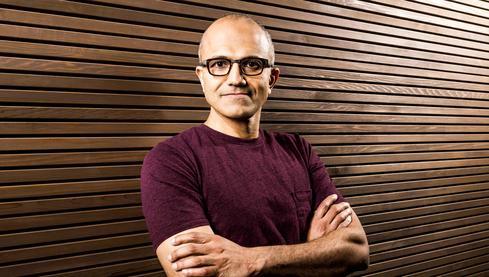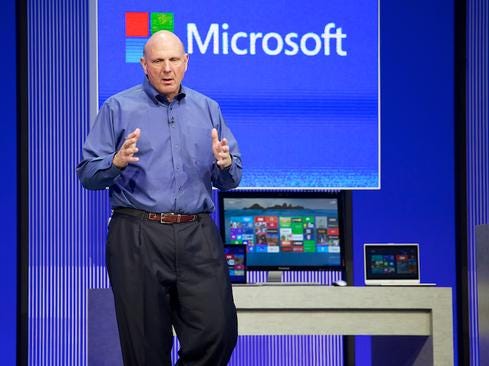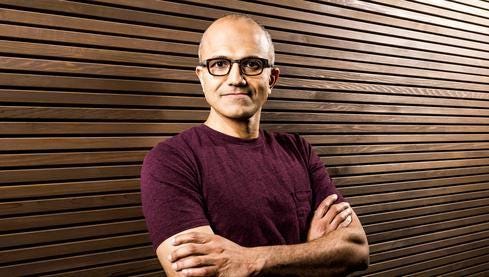Nadella, Gates: Right Team For Microsoft?Nadella, Gates: Right Team For Microsoft?
Does the pairing of Nadella and Gates foretell Microsoft's return to glory or a new era of dysfunction? Take a closer look.


Microsoft In 2013: 7 Lessons Learned
Microsoft In 2013: 7 Lessons Learned (Click image for larger view and for slideshow.)
What will the dynamic be like between new Microsoft CEO Satya Nadella and company founder Bill Gates? Among the myriad unknowns circling Microsoft and its new CEO, Gates's new role as Nadella's adviser is arguably the most important. It speaks to virtually every point of controversy raised as the selection process wore on, from Nadella's autonomy to slay sacred cows, to Gates's influence on company strategy, to the role of consumers in Microsoft's future.
A Wall Street Journal report Wednesday reiterated many of these concerns, citing numerous anonymous sources who said the Microsoft board grew exhausted as months dragged by and eventually chose Nadella after acknowledging that all candidates presented some degree of compromise. Gates's role, which involved his resignation as board chair, was evidently seen as an antidote to Nadella's inexperience with Microsoft's flagship consumer technologies.
[Nadella's priorities should also be your priorities. See Microsoft's Satya Nadella: Marching Orders For Digital Business.]
"Bill is still a legend and he's going to have something to say," said Gartner analyst David Mitchell Smith in an interview. "It's probably a good thing that [Gates] is out of position to call all the shots [as chairman], but it's also good to have him more involved than he was over the last five years."
When Gates said last month that he would offer Microsoft only part-time help, he seemed to downplay reports that he would take a more active role at the company -- only to pledge Tuesday that he would spend at least a third of his time advising Nadella. Since then, most reactions have run been positive, but they've still run the gamut.
Some have heralded the move as Gates's triumphant, Steve Jobs-like return to the company he founded. David Levin, chief of consulting firm Silicon Valley Ventures and a past Gates associate, told The Telegraph that Gates's new role is tantamount to reclaiming the CEO chair. "You cannot underestimate the importance of this," he said.
Others see Nadella's insider status as a sign that Microsoft wants to pursue the path Ballmer and, to a lesser extent, Gates have already established. Dan Fletcher, an analyst at Neuberger Berman, told The Wall Street Journal shortly before Microsoft's announcement that Nadella was a "safe" pick who would disappoint those hoping for a major disruption, and in the Washington Post, Richard Metheny, a management coach for the Chicago-based executive search firm Witt/Kieffer, likened working at Microsoft to working in the Dark Ages.
Figure 1:  Microsoft CEO Satya Nadella
Microsoft CEO Satya Nadella
"You could read [Gates's role] as the new guy coming in as a weak leader," Forrester analyst James Staten told information in an interview -- but he doesn't see it that way. Rather, Staten praised Nadella for building a culture of agility within Microsoft's enterprise and cloud teams.
Staten said Nadella challenged colleagues who were conditioned to 18-month product cycles to deliver constant iterations as often as every week. "It was unheard of in the enterprise server business," Staten remarked. "Nadella had to push people out, overrule people with big businesses."
Indeed, Nadella's fingerprints are in many ways all over the "One Microsoft" reorganization strategy. A November report in the Wall Street Journal claimed Ford CEO Alan Mulally helped Ballmer architect the reorg, but "One Microsoft's" focus on constant update cycles and cloud-first delivery have been part of Nadella's repertoire for years. Under his stewardship, Microsoft's enterprise and cloud products embraced cross-platform strategies and openness, even while critics lambasted Ballmer's Windows strategy as excessively proprietary and protectionist.
Tuesday, Nadella parroted statements Ballmer made last year, when the longtime CEO said the company's machine learning and cloud technologies would produce Windows experiences that anticipate user needs and span devices, services, and applications. In the context of Nadella's past projects, the rhetoric he shared with Ballmer can be read partly as an attempt at cohesion during the transition and partly as the fruit of seeds Nadella's cloud teams have been planting for years.
"Satya has made significant innovations around agility," said Gartner analyst Marv Adrian, who characterized Gates's increased role as a positive.
Apple founder Steve Jobs famously recruited new employees by challenging them to change the world. In his limited remarks so far as CEO, Nadella has channeled a similar tone, with numerous references to the meaning he wants Microsoft employees to find in their work.
Nadella has also sounded like a man eager to demonstrate he knows the challenges before him. Though his statements have eschewed specifics, he's repeatedly said Microsoft will follow a mobile-first, cloud-first strategy, and that the industry demands innovation.
But you'd expect him to say things like that during his first day on the job. Crucially for Microsoft, Nadella, who will start this year with a base salary of
$1.2 million but could rake in up to $18 million in 2015, has a track record to back up calls for innovation.
Staten, whose research focuses on Microsoft's cloud efforts and who has met with Nadella periodically over the years, said the new CEO has relied heavily on data to make his case, such as when he faced an uphill battle rallying Microsoft's Server and Tools division around the cloud.
Nadella referenced these challenges last fall in an interview with ZDNet. He exhibited a willingness to challenge Ballmer and Gates, dismissing their tendencies to yell and scream as "melodrama."
"You come back at it with data," he said at the time, shortly after Ballmer announced his retirement intentions.
If dissenters resisted this analytical approach, Nadella made clear that "he was not going to have them if they didn't get on board," Staten said. He added that he expects the new CEO to bring the same attitude to Microsoft's client group.
He said that Nadella, in a past conversation, characterized Windows 8 as an improperly hedged bet. With the watered-down desktop mode awkwardly tacked onto an unproven touch-first interface, the OS has failed to mobilize developers and partners rooted in the old paradigm.
Even today, nearly 15 months after Win 8's release and more than three months after the rollout of Windows 8.1, the Windows Store remains an afterthought for most developers, who continue to throw their weight behind iOS and Android. With cheap Android tablets gobbling up global market share and iPads still commanding 90% of enterprise tablet activations, why should app makers focus anywhere else?
Nadella now bears responsibility for that question. Reports indicate Microsoft is retreating from some of Windows 8's more hardline UI changes, but Staten predicted that Nadella will focus on showing the value of the tiled Modern, or Metro, interface.
"Up to this point, the unified message has been that cloud, SaaS, and Metro are the [future]," Staten said.
Figure 2:  Microsoft co-founder Bill Gates
Microsoft co-founder Bill Gates
Whatever Nadella's approach toward Windows, he's proved himself willing to second-guess his company's past moves. In November, for example, he told Fortune that the company was forced to play from behind in virtualization after "getting [its] ass kicked by VMware," and that "being captive to old category definitions is really a death sentence in this business." Nadella also said at the time that Microsoft was among the few players realistically vying to become a cloud mega-provider.
Ultimately, Gates is going to have an influence, quite possibly a positive one. Ballmer, who will soon become the company's top shareholder if Gates continues to sell off his stake, is still on the board and will retain some sway. Nadella's outlook as leader should be clearer by April, when the company will host its Build conference for developers in San Francisco. A development announcement of Windows 9 is possibly on the docket. But until then, the Nadella-Gates partnership warrants optimism.
"You can count on two hands the number of people who have managed something of [Microsoft's] size," said Staten of Nadella's new role. "Give him a little credit for running a multi-billion dollar business for the last 15 years."
information Conference is an exclusive two-day event taking place at Interop, where you will join fellow technology leaders and CIOs for a schedule packed with learning, information-sharing, professional networking, and celebration. Come learn from each other and honor the nation's leading digital businesses at our information Elite 100 Awards Ceremony and Gala. You can find out more information and register here. In Las Vegas, March 31 to April 1, 2014.
About the Author
You May Also Like






